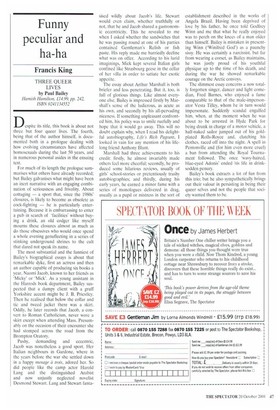Funny peculiar and ha-ha
Francis King
THREE QUEER LIVES by Paul Bailey Hamish Hamilton, £14.99, pp. 242, ISBN 0241134552
Despite its title, this book is about not three but four queer lives. The fourth, being that of the author himself, is documented both in a prologue dealing with how evolving circumstances have affected homosexuals during the last 50 years, and in numerous personal asides in the ensuing text.
For much of its length the prologue summarises what others have already recorded; but Bailey galvanises what might have been an inert narrative with an engaging combination of seriousness and frivolity. About cottaging — a sport that, since the 1980s' closures, is likely to become as obsolete as cock-fighting — he is particularly entertaining. Because it is embarrassing to enter a pub in search of 'facilities' without buying a drink, an old codger like myself mourns these closures almost as much as do those obsessives who would once spend a whole evening genuflecting in a series of stinking underground shrines to the cult that dared not speak its name.
The most substantial and the funniest of Bailey's biographical essays is about that remarkable dyke, first an actress and then an author capable of producing six books a year, Naomi Jacob, known to her friends as 'Micky' or 'Mick'. As a young assistant in the Harrods book department, Bailey suspected that a dumpy client with a gruff Yorkshire accent might be J. B. Priestley. Then he realised that below the collar and tie and tweed jacket there was a skirt. Oddly, he later records that Jacob, a convert to Roman Catholicism, never wore a skirt except when attending Mass. Presumably on the occasion of their encounter she had stomped across the road from the Brompton Oratory.
Pushy, demanding and eccentric, Jacob was nonetheless a good sport. Her Italian neighbours in Gardone, where in the years before the war she settled down in a happy menage a trait, adored her. So did people like the camp actor Harold Lang and the distinguished Arabist and now unjustly neglected novelist Desmond Stewart. Lang and Stewart fanta
sised wildly about Jacob's life. Stewart would even claim, whether truthfully or not, that he and Jacob shared a gastronomic eccentricity. This he revealed to me when I asked whether the sandwiches that he was passing round at one of his parties contained Gentleman's Relish or fish paste. His reply made me hurriedly decline what was on offer. According to his lurid imaginings, Mick kept several Italian girls confined like Strasbourg geese in the cellar of her villa in order to satiate her exotic appetite.
The essay about Arthur Marshall is both briefer and less penetrating. But it, too, is full of glorious things. Like almost everyone else. Bailey is impressed firstly by Marshall's sense of the ludicrous, as acute as his own, and secondly by his all-pervading niceness. If something unpleasant confronted him, his policy was to smile ruefully and hope that it would go away. This will no doubt explain why, when I read his delightful autobiography, Life's Rich Pageant, I looked in vain for any mention of his lifelong friend Anthony Blunt.
Marshall had three achievements to his credit: firstly, he almost invariably made others feel more cheerful; secondly, he produced some hilarious reviews, usually of girls" school-stories or pretentiously trashy autobiographies; and thirdly, during his early years. he earned a minor fame with a series of monologues delivered in drag, usually as a pupil or mistress in the sort of establishment described in the works of Angela Brazil. Having been deprived of love by his father, he once told Godfrey Winn and me that what he really enjoyed was to perch on the knees of a man older than himself. Bailey is mistaken in presenting Winn (Winifred God') as a paunchy sissy. He was certainly a narcissist, but far from wearing a corset, as Bailey maintains, he was justly proud of his youthful physique up to the time of his death, and during the war he showed remarkable courage on the Arctic convoys.
The slimmest essay concerns a now totally forgotten singer, dancer and light comedian, Fred Barnes, who enjoyed a fame comparable to that of the male-impersonator Vesta Tilley, whom he in turn would impersonate. Suddenly scandal engulfed him, when, at the moment when he was about to be arrested in Hyde Park for being drunk in charge of a motor vehicle, a half-naked sailor jumped out of his goldplated Rolls-Royce and, clutching his clothes, raced off into the night. A spell in Pentonville and (for him even more cruel) a ban from attending the Royal Tournament followed. The once 'wavy-haired, blue-eyed Adonis' ended his life in drinksodden penury.
Bailey's book extracts a lot of fun from this trio; but he also sympathetically brings out their valour in persisting in being their queer selves and not the people that society wanted them to be.


























































































 Previous page
Previous page